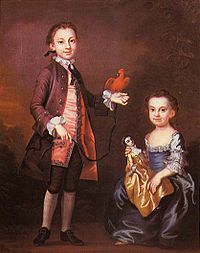Mann Page
This article needs additional citations for verification. (November 2010) |

Mann Page (1749–1781), sometimes referred to as Mann Page, III, was an American lawyer and planter from Spotsylvania County, Virginia and a delegate for Virginia to the Continental Congress in 1777. His brother was Virginia Governor John Page.
Life[]

Mann was born to and Ann Corbin Tayloe, daughter of John Tayloe I, (his third wife) at Rosewell Plantation in Gloucester County, Virginia. Mann was one of the younger of seven children. He attended the College of William & Mary before reading law.
Page moved to Spotsylvania County and established his own plantation, known as Mannsfield near Fredericksburg, an almost direct replica of Mount Airy, the seat of the Tayloe Family. He married Mary Tayloe and the couple had three children. Around 1735, Page's father's half-sister, Maria Judith Page, married William Randolph III, the son of Thomas Randolph (of Tuckahoe) and the grandson of William Randolph I, and had four children.[1]
Page served only one term in the Continental Congress.
He defended a slave named Billy who wrote a letter to Thomas Jefferson and was sentenced to death by hanging for treason as a result.[2][3]
Death and legacy[]
Mann Page died at home in 1781, and was buried in the family plot at Mannsfield. The plantation was mostly destroyed during the Battle of Fredericksburg in the Civil War, but a remnant remains in the battlefield park.
The ruins of Rosewell Plantation, the home of early members of the Page family and one of the finest mansions built in the colonies, sit on the banks of the York River in Gloucester County. In 1916, a fire swept the mansion leaving a magnificent shell which is testament to 18th century craftsmanship and dreams, and the site of ongoing archaeological studies.
See also[]
References[]
- ^ Page, Richard Channing Moore (1893). "Randolph Family". Genealogy of the Page Family in Virginia (2 ed.). New York: Press of the Publishers Printing Co. pp. 249–272.
- ^ Boles, John B.; Hall, Randal L. (2010). Seeing Jefferson Anew: In His Time and Ours. University of Virginia Press. p. 115. ISBN 978-0813929934. Retrieved 25 August 2015.
- ^ Schwarz, Philip J. (1998). Twice Condemned: Slaves and the Criminal Laws of Virginia, 1705-1865. The Lawbook Exchange, Ltd. p. 189. ISBN 9781886363540. Retrieved 25 August 2015.
External links[]
- 1749 births
- 1781 deaths
- Continental Congressmen from Virginia
- 18th-century American politicians
- Virginia lawyers
- Page family of Virginia
- People from Spotsylvania County, Virginia
- American colonial people
- American people of English descent
- American planters
- College of William & Mary alumni
- American lawyers admitted to the practice of law by reading law
- Tayloe family of Virginia